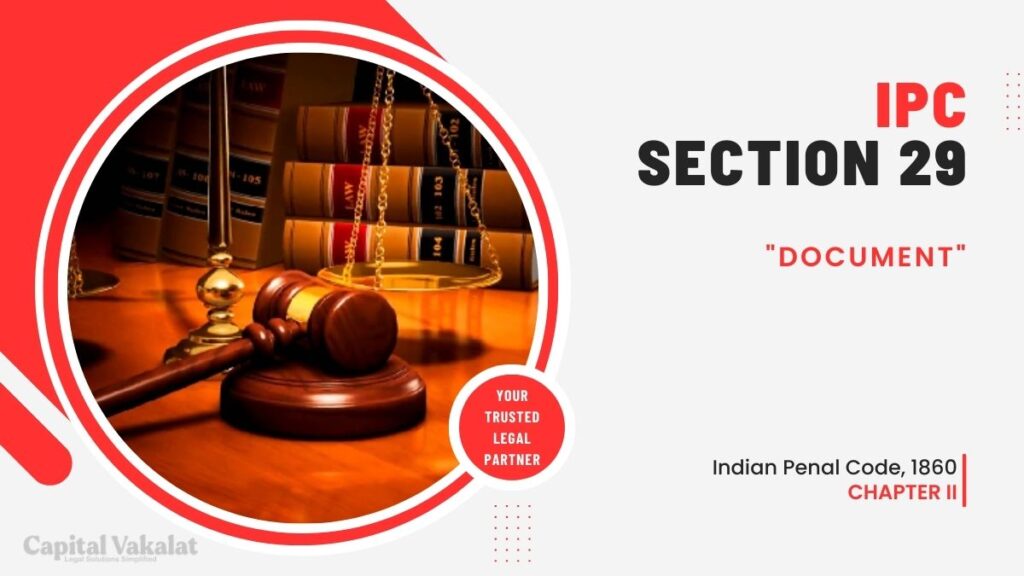In the realm of legal matters, the Indian Penal Code (IPC) is a cornerstone that defines and regulates various offenses and their penalties. One such critical aspect of the IPC is Section 29, which pertains to the term “document.” In this comprehensive guide, we’ll delve into the significance of Section 29 IPC and the intricate nuances associated with the interpretation of the term “document.”

In a world driven by written records, the term “document” holds immense significance. Section 29 of the IPC plays a pivotal role in ensuring the integrity and authenticity of various documents presented as evidence in legal proceedings.
Defining Section 29 IPC
Section 29 of the Indian Penal Code, often referred to as IPC, elucidates the term “document” in a comprehensive manner. According to this section, a document is any matter expressed or described upon any substance through letters, figures, or marks, or by more than one of these means, intended to be used or which may be used for the purpose of recording that matter.
Broadening the Horizon: Types of Documents
Documents under Section 29 IPC can be broadly classified into two categories: public documents and private documents.
Public Documents
Public documents are those that are maintained by public servants while performing their official duties. These documents hold legal significance and can include government records, court judgments, and official registers.
Private Documents
Private documents, on the other hand, are not maintained by public officials in their official capacities. These documents are created by individuals or private entities and can include contracts, wills, and agreements.
Crucial Elements of Section 29
For an offense to fall under Section 29 IPC, certain elements need to be established.
Intention to Cause Harm
The section necessitates that the document is created or used with the intention to cause harm or to deceive someone.
Forgery and Falsification
Forgery and falsification of documents are key aspects covered under this section. Any act involving creating a false document, altering an existing one, or using a forged document can attract legal consequences.
Section 29 IPC in Practice
Document Forgery Cases
Over the years, numerous cases of document forgery have come to light. Instances of forged educational certificates or property documents have posed serious challenges to legal systems.
Document Tampering Instances
Tampering with official documents, such as changing the date or modifying critical information, has raised concerns about the authenticity of records and evidence.
Intersection with Other Legal Sections
Section 464 IPC: Making a False Document
This section deals explicitly with making a false document with the intent to commit fraud.
Section 466 IPC: Forgery of Record of Court or Public Register
Forgery of records maintained by courts or public offices is addressed under this section.
Legal Consequences and Penalties
Individuals found guilty under Section 29 IPC can face imprisonment and fines as per the gravity of the offense. Courts take into consideration various factors such as intent, extent of harm caused, and previous criminal record.
Challenges in Establishing Document Authenticity
Proving the authenticity of documents can be challenging, given the advancement in technology that enables sophisticated forgery techniques.
Preservation of Electronic Documents
In the digital age, the concept of documents has expanded to include electronic records. Ensuring the integrity and preservation of electronic documents is a complex task.
Evolution of Section 29 IPC
Over time, Section 29 has evolved to encompass modern forms of documents, including electronic records and digital signatures.
Ensuring Fair Investigations
Proper investigation procedures are crucial in cases involving document-related offenses. Ensuring fairness and accuracy is vital to upholding justice.
Safeguarding Document Integrity
Efforts to prevent document-related offenses include implementing strict protocols for document creation, storage, and access.
The Role of Forensic Experts
Forensic experts play a vital role in determining the authenticity of documents, employing scientific methods to analyze ink, paper, and other material components.
Conclusion
Section 29 IPC serves as a guardian of truth and integrity in the legal domain. The concept of documents has evolved, but its significance remains unwavering. Upholding the authenticity of documents is paramount to maintaining the sanctity of legal proceedings.
Here are some external resources that provide detailed information about IPC Section 29 and the concept of “document” in legal contexts:
- Indian Penal Code – Section 29: Read the full text of Section 29 of the Indian Penal Code, defining the term “document” and its legal implications.
- Legal Dictionary: Document: Learn more about the legal definition and types of documents as interpreted in various legal systems.
- Document Forgery: Types, Techniques, and Prevention: Explore the world of document forgery, its various techniques, and how forensic experts detect and prevent it.
- Electronic Documents and Their Legal Validity: Dive into the legal validity of electronic documents and the challenges of preserving their integrity.
Remember to verify the credibility of these external sources before citing them for any legal or educational purposes.
FAQs
What are public documents?
Public documents are records maintained by public servants in their official capacity.
What is the penalty for document forgery?
The penalty for document forgery can range from imprisonment to fines, based on the severity of the offense.
The penalty for document forgery can range from imprisonment to fines, based on the severity of the offense.
Section 29 IPC has evolved to encompass electronic documents and modern forms of record-keeping.
What role do forensic experts play in document authenticity?
Forensic experts use scientific methods to determine the authenticity of documents, including analyzing materials like ink and paper.